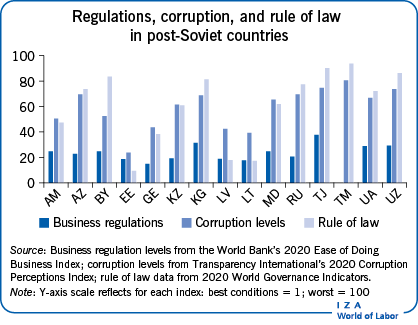Elevator pitch
Since the collapse of the Soviet Union, the differing impact of institutions on entrepreneurship development is undeniable. Several post-Soviet countries benefitted from early international integration by joining the EU, adopting the euro, and becoming OECD members. This process enabled entrepreneurship to develop within institutional contexts where democratic and free market principles were strengthened. In general, however, post-Soviet economies continue to be characterized by higher levels of corruption, complex business regulations, weak rule of law, uncertain property rights and often, lack of political will for institutional change.

Key findings
Pros
International integration such as EU membership enables member countries to enact the reforms needed for productive entrepreneurship.
IT and tech sector business development offers new opportunities for increasing entrepreneurship in post-Soviet countries.
Increasing numbers of productive entrepreneurs can support sustained institutional reform.
The post-Soviet country diaspora has substantial potential to drive economic development, innovation and productive entrepreneurship in their home countries.
Cons
The Soviet legacy of negative attitudes and restrictive policies towards entrepreneurship continues to influence policy making in several post-Soviet countries.
High levels of corruption undermine productive entrepreneurial development and sustainable institutional reform.
Weak institutional environments stunt business growth and drive entrepreneurs to operate in the informal sector.
Lack of political will and commitment limits the sustainability of programs to support entrepreneurship development.